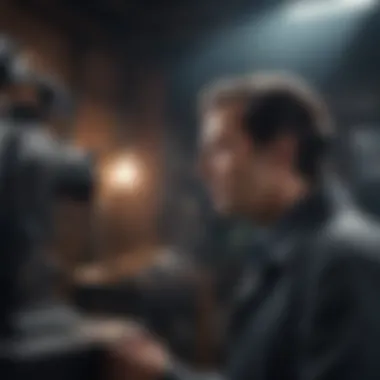Exploring the Depths of the Sherlock TV Series


Intro
The exploration of the Sherlock TV series transports us into a modern interpretation of classic detective storytelling, giving proper nods to Sir Arthur Conan Doyle’s original works. This thrilling adaptation, which aired on BBC, not only engaged audiences but also stirred up discussions about the very nature of mystery and character dynamics. By dissecting the series' narrative framework, its complex characters, and its multifaceted impact on culture, this article aims to construct a roadmap that unveils how Sherlock becomes a distinguishing hallmark in television history.
Embarking on this journey, we will highlight the nuances that set this series apart, delving into what fuels the ardent fanbase and perennial discussions. With an eye toward both storytelling and production, we will weave together insights from critical reception and cultural discussions, illustrating how Sherlock deftly straddles the line between innovation and reverence for its origins.
"The show employs a blend of cerebral complexity and gripping drama, appealing to those who savor depth in their intellectual engagements."
Whether you are a devoted follower of the original tales or a newcomer charmed by the game of wits portrayed on screen, you'll find that this examination promises to provide an enriched understanding of Sherlock — its layers, its trends, and its legacy in the tapestry of modern storytelling.
Foreword to Sherlock
The sport of deduction was never meant to be a simple game; it is a complex art form that piques the human mind. As we unravel the layers of the Sherlock TV series, we get to the heart of what makes it tick – not just the brilliance of its characters but the very fabric of its narrative structure. The significance of diving deep into this introduction serves as the keystone for comprehending the entire structure of the show.
This section sets the stage, giving readers a taste of what lies ahead. Through various lenses, the narrative intricacies are explored, paving way for an analytical discussion that resonates with fans and newcomers alike.
Overview of the TV Series
Sherlock, created by Steven Moffat and Mark Gatiss, debuted on the BBC in 2010, breathing fresh life into Arthur Conan Doyle's beloved detective stories. This contemporary adaptation not only updates characters and settings but also weaves intricate modern narratives that echo the intellectual puzzles of the Victorian era.
The show is distinctly structured in a way that each episode acts like a self-contained film while remaining part of an overarching story. Benedict Cumberbatch takes on the role of Sherlock Holmes, playing him with a mix of brilliance and aloofness, capturing the essence of an archetype. Martin Freeman complements this perfectly as Dr. John Watson, whose grounding influence tempers Holmes's eccentricities. Their dynamic is central to the show’s charm and appeal.
Notably, the series managed to engage a global audience through its sharp dialogue, clever twists, and high-stakes plotlines. The visual style, storytelling techniques, and character development made Sherlock not just a retelling but an innovative exploration of the original material, attracting a diverse fan base and consummate critical acclaim.
Context of Adaptation
Understanding the context of Sherlock raises layers of insight into why this rendition resonates so well with viewers today. In a world dominated by rapid technological advancements and shifting social paradigms, Moffat and Gatiss took risks by placing 19th-century characters into a 21st-century milieu. The choice to modernize Holmes and Watson was not merely cosmetic; it addressed contemporary issues while staying true to the spirit of the original narratives.
Both writers made astute choices in this adaptation process:
- Technological Integration: From the use of smartphones to the methodical manner in which Holmes gathers and analyzes data, Sherlock reflects a society increasingly reliant on technology.
- Cultural References: The incorporation of modern behavioral trends and societal issues showcases a willingness to engage with a broad audience, increasing relatability without losing the essence of Doyle’s work.
- Character Arcs: Rather than static characters confined to their roles, Holmes and Watson evolve throughout the series, displaying depth and complexity that many adaptations overlook.
By framing these adaptations within current societal norms, Sherlock engages viewers who find familiarity in its modern references, all while appealing to the nostalgia of those who love the original tales. This clever amalgam of old and new not only captivates audiences but also serves as a benchmark for future adaptations.
"The great advantage of a habit is that it often diminishes the need for conscious choice." - Sherlock Holmes
The Narrative Framework
The narrative framework of the Sherlock TV series is a fundamental pillar that supports its unique storytelling approach. Diving into how the series interweaves classic elements from Arthur Conan Doyle's works with contemporary twists broadens the understanding of modern adaptations. Here, we explore how plot structure, character development, and thematic depth harmoniously blend to create a captivating narrative tapestry.
Story Arcs and Themes
Sherlock is renowned not just for its whodunit thrills but for its intricate story arcs and underlying themes. Each season unfolds like a puzzle box, with the characters evolving under the strain of personal and external conflicts. Themes such as friendship, loyalty, and the darker side of human nature are woven through the narrative. The series invites viewers to ponder the moral complexities faced by Sherlock Holmes and Dr. John Watson.
Take, for instance, the relationship between Sherlock and his older brother, Mycroft Holmes. Their interactions unravel deeper familial themes, questioning the price of genius versus the bonds of blood. The dynamic here serves as a reflection on how intelligence can isolate individuals, even amidst those closest to them. This exploration of familial themes keeps the audience engaged, prompting them to consider their own relationships in the light of Sherlock's experiences.


Episodic Structure
The episodic structure of Sherlock is one that marries the best of both worlds: the self-contained storytelling of a classic detective series and the serialized arcs of modern television. Each episode, running about 90 minutes, stands as both an entry point and culmination of the overall narrative design. This balance allows for deep character exploration while delivering a satisfying resolution by the end of each episode.
Some episodes are directly lifted from Doyle's classics yet transformed to reflect current societal issues, leading to a fresh narrative experience. For instance, "A Scandal in Belgravia" reinterprets the original's love themes, wrapping them in espionage and digital privacy concerns. This bridging of past and present narratives is a testament to the series’ skillful reimagining of traditional storytelling, resonating meaningfully with today's audience.
Climactic Moments
Climactic moments in Sherlock are not merely high-tension scenes; they are turning points that challenge both protagonist and viewer. They often provoke deeper reflections on the nature of truth and morality. One pivotal moment occurs in the series two finale, "The Reichenbach Fall," where Sherlock feigns his own demise. This moment redefines not just his character but the entire perception of heroism within the narrative.
"There’s a fine line between genius and madness, and often, it’s the latter that drives the former."
The weight of these climaxes does not just serve to shock the audience; they underline the psychological turmoil that characters endure. Such moments force characters like Watson to confront their own beliefs about loyalty and loss, resonating well with audiences and keeping them on the edge of their seats.
By skillfully crafting the narrative framework through carefully structured story arcs, a cohesive episodic format, and impactful climactic moments, Sherlock elevates its storytelling. This weaving of intricate narratives ensures that the series stands not just as a homage to a literary icon, but as a significant contribution to modern television narratives.
Character Analysis
Analyzing the characters in the Sherlock TV series provides a window into its depths and underscores the broader themes that permeate the narrative. Each character not only drives the plot forward but also reflects various aspects of human nature, morality, and intellect, key elements that resonate with the audience. \nThis part of the article examines the intricate layers of characterization and how they contribute to the show's undeniable impact.
Sherlock Holmes: The Genius
Sherlock Holmes stands as an icon, a figure representing the apex of human intellect and deductive reasoning. The series redefines this legendary character for contemporary audiences, steering clear of the typical portrayals that have dulled over time. Played with remarkable nuance by Benedict Cumberbatch, this Holmes is not merely a detective but a complex individual grappling with his own quirks and vulnerabilities. \n His ability to observe seemingly trivial details and connect the dots sets him apart. This brilliance, however, is tinged with aloofness. For instance, his most striking moments often come with an emotional detachment that can alienate those around him. This character complexity manifests during his interactions with Watson, where equal parts admiration and frustration can be seen.
Furthermore, the show leans heavily into Holmes's struggle with social connections, showcasing right from the first episode how he prefers detective work to human interaction, a motif that resounds throughout the series.
Dr. John Watson: The Loyal Companion
Contrasting sharply with Holmes, Dr. John Watson, portrayed by Martin Freeman, acts as the emotionally grounded counterbalance to the detective's erratic ways. Watson serves not only as chronicler of their adventures but as the audience's surrogate, translating Holmes’s often cryptic insights into comprehensible thoughts. His loyalty is unwavering, and this creates a rich dynamic between the two.
Often bringing warmth to the series, Watson's character evolves significantly over the show's run. At first, he's merely a war veteran with his own traumas, yet he quickly becomes an integral part of the investigations. The depth of his friendship with Sherlock is one of the core pillars of the show; when struggles arise, it is usually Watson who reaches out to understand or rein in Holmes's more chaotic impulses. This element leads viewers to ponder the true nature of friendship and trust in relationships.
Supporting Characters: A Dynamic Ensemble
The world of Sherlock Holmes is populated with an array of dynamic supporting characters who add layers to the story, each playing a crucial role in shaping the narrative landscape. Characters like Molly Hooper, Mrs. Hudson, and Detective Lestrade enrich the universe created in the series.
Molly, portrayed by Louise Brealey, introduces themes of unrequited love and emotional intelligence that resonate deeply with the audience. Additionally, Mrs. Hudson, played by Una Stubbs, brings a maternal touch, contrasting sharply with the cerebral nature of Holmes. She often serves as the voice of wisdom, grounding the otherwise chaotic environment that Holmes creates.
Detective Lestrade, embodied by Rupert Graves, highlights the tension between traditional law enforcement and the unorthodox methods employed by Holmes. The interactions between these supporting characters and the leads offer humorous relief and valuable insights into the main characters’ psyche, enhancing the overall narrative.
Antagonists and Their Roles
The series crafts its antagonists with precision, presenting them not only as mere obstacles but as reflections of Sherlock's own vulnerabilities and moral ambiguities. Villains like Jim Moriarty, played by Andrew Scott, serve as a perfect foil to Holmes. Moriarty's intellect and unpredictability challenge Holmes on an intellectual level, pushing him out of his comfort zone.
Moriarty isn’t just a villain for the sake of being evil; he’s a complex character who understands the detective's mind, making their encounters electrifying. Likewise, characters such as Charles Augustus Magnussen expose different facets of power and control that resonate with viewers. The socio-political implications underlying these antagonists amplify the stakes, showing that the conflict often transcends the personal, delving into larger societal questions.


In short, the character analysis of Sherlock offers vivid insights, exploring not just how these individuals advance the plot but also how they evoke emotional resonance and reflect intricate human experiences. The show thrives on these layered portrayals, making it a rich text worthy of further examination.
Cinematic Techniques
Cinematic techniques play a pivotal role in bringing the Sherlock series to life, crafting an engaging viewing experience that resonates deeply with audiences. Beyond just storytelling, these techniques serve to highlight the psychological intricacies of characters and elevate the thematic elements of the narrative. The series effectively utilizes various methods that breathe life into Arthur Conan Doyle’s timeless stories, making them captivating for modern viewers.
Visual Storytelling
In Sherlock, visual storytelling transcends mere imagery. The series employs a range of striking visuals and clever camera work to convey complex ideas without uttering a word. For example, the frequent use of close-ups captures the subtleties of emotion in characters—details that a casual viewer may overlook but feel on a subconscious level. The stark contrasts in color and lighting also reflect mood changes, often mirroring Sherlock's own turbulent state of mind.
Furthermore, graphical elements, like the text overlays during deductions, allow the audience to engage in Sherlock's thought processes. This innovative style gives viewers a front-row seat to the mind of a detective, creating an immersive experience that feels fresh and dynamic. It transforms the viewer from a passive spectator to an active participant in the investigation, enhancing the overall narrative depth.
"The way they visualize Sherlock's deductions lets us step into his shoes, or rather, his mind. It’s genius!"
Editing and Pacing
The editing of Sherlock is masterfully orchestrated, crucial for maintaining the fast-paced tension that characterizes the series. Quick cuts are often utilized to heighten suspense, especially during critical moments when time is of the essence. The juxtaposition of scenes—intercutting between different timelines or perspectives—engages the audience, keeping them on edge while unraveling intricate plots.
Moreover, pacing is paramount in this series. The rhythm slows down in moments of emotional weight, allowing the viewer to absorb significant developments in character arcs. For instance, during poignant dialogues between Sherlock and Watson, the deliberate pacing lets the gravity of their relationship sink in, adding layers to their dynamic. This sense of tension and release is crucial in keeping viewers invested in both the outcome of the cases and the personal journeys of the characters.
Musical Score and Sound Design
The musical score of Sherlock is nothing short of mesmerizing. Composed by David Arnold and Michael Price, the music serves as an additional character in the storytelling—setting the mood, framing encounters, and enhancing emotional stakes. The blend of orchestral music with modern elements resonates well, echoing the contemporary reimagining of the classic tales.
Sound design also plays a significant role in shaping the atmosphere. From the echoing footsteps in empty London streets to the subtle ambient sounds that ground the stories in reality, every detail counts. This meticulous attention to sonic landscape draws viewers into the world the characters inhabit.
Furthermore, the use of silence at crucial junctures works wonders. Whether it’s a dramatic pause during Watson’s contemplation or moments of clarity for Sherlock, silence punctuates their experiences, often saying more than words ever could.
Through these cinematic techniques—visual storytelling, editing and pacing, and the musical score—Sherlock crafts a compelling narrative that remains a hallmark of modern television. These elements not only enhance the experience but also pay homage to the original material while breathing life into a new interpretation.
Reception and Critique
In any discourse surrounding impactful media, the reception and critique of a work provide invaluable insights into its significance and the ways it strikes a chord with audiences and critics alike. The Sherlock TV series is no exception; examining these aspects sheds light on the thematic depth and broader societal implications present in its storytelling. Understanding both critical acclaim and audience reception is crucial for grasping the show's success and longevity, along with its ability to inspire discussions across various platforms.
Critical Acclaim
Upon its debut, Sherlock received much praise from critics, and for good reason. Its clever writing and contemporary take on classic literature garnered widespread recognition. The creative team, led by Steven Moffat and Mark Gatiss, took daring steps that deviated from the usual adaptation tendencies, while still maintaining a respect for Arthur Conan Doyle's original works.
Prominent publications praised individual episodes for their tight scripts, particularly highlighting the dynamics between the titular characters. The show daringly embraced technology, weaving modern-day elements such as text messaging and social media into the fabric of the narrative. Numerous critiques pointed out that Sherlock was not just a series about solving crimes but rather an exploration of complex relationships and modern human emotions. In fact, one might say the series left a significant footprint in the realm of television.
"Sherlock breathes new life into a tired genre, captivating audiences with its sharp intelligence and stylish execution."
— Television Critic
Audience Reception
The audience received Sherlock with open arms, making it a cultural phenomenon. It became common to see fans passionately discussing plot twists or theorizing character motives online, often spanning various platforms like forums and social media. The clever integration of humor and drama resonated with viewers, as many found themselves either rooting for or despising certain characters. The chemistry between Benedict Cumberbatch and Martin Freeman formed a deep emotional connection for viewers, making them invested in the fates of Holmes and Watson.


The show's impact extended beyond viewership numbers; it sparked a revival of interest in detective fiction overall. Bookstores reported increased sales of Arthur Conan Doyle's works, as many viewers sought to delve deeper into the original canon. This newfound appetite for the classics further elevated Sherlock as a bridge connecting modern audiences with historical texts.
Awards and Nominations
Like a cherry on top of an already delicious cake, Sherlock received a myriad of awards and nominations during its run. Notably, it clinched the prestigious BAFTA Television Awards multiple times, showcasing not only its critical success but also its effectiveness in engaging audiences. At the Primetime Emmy Awards, the series took home accolades for outstanding mini-series and acting categories, underscoring the triumphs of its cast in bringing complex characters to life.
Here's a brief overview of some significant recognitions:
- BAFTA Television Awards: Best Drama Series
- Primetime Emmy Awards: Outstanding Lead Actor in a Miniseries
- National Television Awards: Most Popular Drama
In summary, the combined critical acclaim, strong audience reception, and a string of prestigious awards all contribute to the robust legacy of Sherlock. By bridging classical storytelling with contemporary creativity, the series has established itself not only as a successful adaptation but as a significant touchstone in modern television history.
Cultural Impact
The cultural significance of the Sherlock TV series is not merely an afterthought; it firmly establishes the show as a cornerstone in contemporary media. Its influence extends far beyond the realm of entertainment, affecting literature, theater, and even social discourse. The series not only reinterprets Arthur Conan Doyle's classic tales but also weaves together modern themes that resonate with today's audiences. This section addresses how Sherlock has shaped modern storytelling in various forms, its role in popular culture, and the discussions it fosters about adaptation and creativity.
Influence on Modern Adaptations
The reboot of Sherlock in 2010 sparked a wave of reinterpretations across the globe. One cannot overlook the impact it has had on how classic characters are reimagined for contemporary settings. Many adaptations have since escaped the confines of Victorian England, embracing diverse cultures and new narrative styles. For instance, series like Elementary, set in present-day New York, or Sherlock Holmes: A Game of Shadows, show how the character’s essence can be retained while exploring different contexts.
Moreover, this Sherlock adaptation encourages modern storytellers to challenge traditional structures and genre conventions. It pushes the envelope, prompting them to narrative models where past and present intersect seamlessly. The technique of using technology to inform investigations—texting, social media sleuthing—also found its way into adaptations inspired by the show, emphasizing a more relatable and real-time approach to mystery-solving. This not only updates the methods of detection but also makes the characters’ journeys more accessible to a younger audience.
"Every good detective story is not just about solving a murder but also about unveiling the intricacies of the human experience."
A prominent critic observing the evolution of adaptations.
The Sherlock Phenomenon
Sherlock transcends being just a TV series; it has grown into a cultural phenomenon. Within a few years, it engendered a fanbase that extends into academia, fandom communities, and meme culture. Passionate aficionados have poured into forums on platforms like Reddit, disassembling episodes to discuss themes, plot intricacies, and character developments. Fans have even crafted intricate theories and predictions that challenge the narrative trajectory of the show.
The phenomenon is not restricted to just enthusiasts. Scholars have analyzed the series in the context of adaptation studies, scrutinizing how it maintains fidelity to the original source while simultaneously reinventing it. Conventions and gatherings spotlight this enthusiasm, where fans celebrate both the literary and cinematic legacy of Sherlock Holmes. The blending of literature with film and television has made room for intellectual conversations about narrative structure, character identity, and cultural resonance, positioning Sherlock as a definitive study in adaptation.
As we consider the cultural impact of Sherlock, it's clear that its influence will echo for years to come, shaping future interpretations and continuing discussions on the nature of storytelling.
Epilogue
In the grand tapestry of television, the "Sherlock" series stands as a jewel, illuminating both the brilliance of its storytelling and the complexities of its beloved characters. This article has shed light on multiple facets of the series, from its intricate narrative framework to the memorable performances brought forth by its dynamic cast. Understanding these elements is crucial for fans, scholars, and casual viewers alike who wish to dive deeper into the layers that comprise this modern adaptation of Arthur Conan Doyle’s enduring tales.
Summing Up the Legacy
The legacy of "Sherlock" extends beyond mere viewership numbers. It reshaped the landscape of detective stories, blending traditional elements with modern sensibilities. The portrayals of Sherlock Holmes and Dr. John Watson, notably by Benedict Cumberbatch and Martin Freeman, ignited discussions on character complexity and development, leaving an indelible mark on how we view heroism and friendship. Subsequently, it has influenced countless adaptations, signposting a pathway for reinventions of classic narratives across various mediums.
- Cult Following: The show's unique style and wit fostered a devoted fanbase, who engage in discussions about plot intricacies and character arcs.
- Cultural References: Iconic quotes and scenes became part of the zeitgeist, showing the series’ ability to permeate cultural consciousness.
- Academic Analysis: Scholars have taken to examining the series, drawing comparisons to the original texts and exploring its impact on contemporary media.
"The only thing I cannot understand is why everyone isn't buzzing about it quite as much as I am!" – A quote that echoes the sentiments shared by many fans.
Future of the Sherlock Franchise
As we look ahead, the future of the "Sherlock" franchise presents numerous possibilities. With fans clamoring for more stories featuring the clever detective and his intrepid companion, the door remains wide open for fresh narratives in this established universe. Here are some potential avenues:
- New Adaptations: Given the popularity of reboots and remakes in the current entertainment landscape, we might see alternative takes that delve into unexplored territories of Holmes’ life.
- Spin-offs: There’s the potential for spin-off series focusing on secondary characters, providing a broader understanding of the world they inhabit.
- Film Opportunities: Future films could explore longer, more intricate plots that develop the characters beyond the episodic format.
Ultimately, the enduring allure of Sherlock Holmes ensures that the franchise will remain a topic of discussion and exploration for years to come. With its rich history and continued evolution, fans can only anticipate what fresh interpretations and adventures await in the future.



